|
 Universal access to health is the guiding principle and health equity among nations and for all people is the major objective of global health. Global health initiatives were established to tackle increasing global health threats, reduce disparities within communities and between nations and contribute to a world where people live healthier, safer and longer lives.The global health initiatives collaborative work in the Region covers several areas: AIDS, tuberculosis and malaria, immunization programmes, maternal and child health, tobacco use, human resources, emerging diseases, nutrition, health promotion and health system strengthening. Universal access to health is the guiding principle and health equity among nations and for all people is the major objective of global health. Global health initiatives were established to tackle increasing global health threats, reduce disparities within communities and between nations and contribute to a world where people live healthier, safer and longer lives.The global health initiatives collaborative work in the Region covers several areas: AIDS, tuberculosis and malaria, immunization programmes, maternal and child health, tobacco use, human resources, emerging diseases, nutrition, health promotion and health system strengthening.
The Global Fund and Gavi, the Vaccine Alliance are the main institutions that provide substantial funding to eligible countries in the Region. Seven countries – Afghanistan, Djibouti, Pakistan, Somalia, Sudan, Syrian Arab Republic and Yemen – are eligible for Gavi support on immunization and health system strengthening, and 12 are eligible for Global Fund grants, including the seven supported by Gavi.
Protracted social and political unrest in most grant-recipient countries continues to be a major challenge. Insecurity in many places hampers access to social services with the health sector being the worst affected, and the loss of human capital has severely weakened health services and systems in affected countries. Furthermore, global health initiatives have created parallel systems that undermine the holistic approach for health system development, and the principles of external aid, such as ownership and harmonization, are not adequately applied.
|